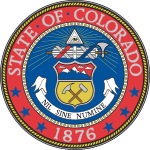2024 Colorado Proposition 131
| ||
Establishing All‑Candidate Primary and Ranked Choice Voting General Elections | ||
| Elections in Colorado |
|---|
 |
2024 Colorado Proposition 131 is a proposed ballot measure that will appear before voters in Colorado during the 2024 general election. The citizen initiated proposition would replace Colorado's current partisan primaries with non-partisan blanket primaries and would implement ranked-choice voting for most statewide and state legislative general elections in which the top four candidates in the primary would qualify for the general election ballot.[1]
Background
[edit]Currently, Colorado uses partisan primaries to select who appears on general election ballots and a first past the post voting system like most US states. Should Proposition 131 pass, Colorado would switch to a system of blanket primaries and ranked choice general elections. Similar systems were adopted by Maine in 2016 and Alaska in 2020. The proposition was initiated by citizen petition, largely funded by health care executive Kent Thiry. Similar proposals are on the ballot in Idaho, Montana, Nevada, and Oregon, also funded by Thiry.[1]
In 2024, Governor Jared Polis signed into law Senate Bill 210 which heightened requirements for the adoption of ranked choice voting in Colorado. Specifically, the law requires that at least 12 communities of various required sizes adopt ranked choice voting at a local level before it can be implemented statewide. This has made it unclear how quickly ranked choice voting would be implemented in Colorado should Proposition 131 pass. However, Polis has committed to ensuring ranked choice voting is put into effect by the 2028 election if voters approve the proposition in addition to endorsing the measure.[2]
Contents
[edit]The proposition will appear on the ballot as follows:[3]
Shall there be a change to the Colorado Revised Statutes creating new election processes for certain federal and state offices, and, in connection therewith, creating a new all-candidate primary election for U.S. Senate, U.S. House of Representatives, governor, attorney general, secretary of state, treasurer, CU board of regents, state board of education, and the Colorado state legislature; allowing voters to vote for any one candidate per office, regardless of the voter’s or candidate’s political party affiliation; providing that the four candidates for each office who receive the most votes advance to the general election; and in the general election, allowing voters to rank candidates for each office on their ballot, adopting a process for how the ranked votes are tallied, and determining the winner to be the candidate with the highest number of votes in the final tally?
Campaigns
[edit]Support
[edit]The campaign in support of Proposition 131 is being led by Colorado Voters First. Additionally, Colorado's official voter guide offers the arguments in support of Proposition 131 that a blanket primary system would create an equal opportunity for everyone to participate in primary elections, increase voter turnout in primaries, and make general elections more competitive. It also offers that ranking candidates in order of preference in general elections gives voters more choices, minimizes the spoiler effect, and results in outcomes that better reflect the will of the voters.
- State officials
Opposition
[edit]There are two main groups leading opposition against Proposition 131: Voters Rights Colorado and First Choice Counts.[4] Colorado's official voter guide also offers the arguments against Proposition 131 that the measure will make elections more expensive, confuse voters, and weaken faith in the outcomes of Colorado elections. Additionally, it offers that political parties should have separate primaries, with unaffiliated voters already being able to participate in Colorado's primary system, and a blanket primary system would result in more expensive primary campaigns.[5]
- Organizations
Polling
[edit]| Poll source | Date(s) administered |
Sample size[a] |
Margin of error |
For Proposition 131 |
Against Proposition 131 |
Undecided |
|---|---|---|---|---|---|---|
| Keating Research | August 28-September 1, 2024 | 400 (LV) | ± 3.5% | 56% | 21% | 23% |
Results
[edit]Results will begin being made public for Proposition 131 at 7:00 pm on November 5, 2024. Proposition 131 requires a simple majority to pass.
| Choice | Votes | % |
|---|---|---|
| Result not yet known | ||
| Total votes | — | 100.00 |
See also
[edit]Notes
[edit]- ^ Key:
A – all adults
RV – registered voters
LV – likely voters
V – unclear
References
[edit]- ^ a b Kenney, Andrew (August 29, 2024). "Colorado to vote on ranked-choice voting, eliminating partisan primaries". Colorado Public Radio. Retrieved September 19, 2024.
- ^ Paul, Jesse (September 20, 2024). "Colorado's all-candidate primary and ranked choice general election ballot measure is poised to pass, poll shows". Colorado Sun. Retrieved September 24, 2024.
- ^ "2024 State Ballot Information Booklet" (PDF). Colorado General Assembly. September 11, 2024. Retrieved September 17, 2024.
- ^ Jena Griswold. "Amendments and Propositions on the 2024 Ballot". Colorado Secretary of State. Retrieved September 18, 2024.
- ^ Zelinger, Marshall (September 24, 2024). "What does Proposition 131 mean for Colorado?". KUSA. Retrieved September 24, 2024.
